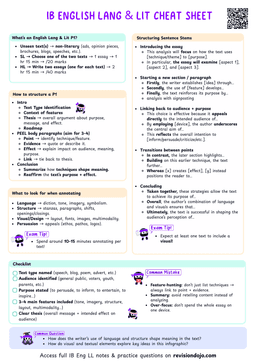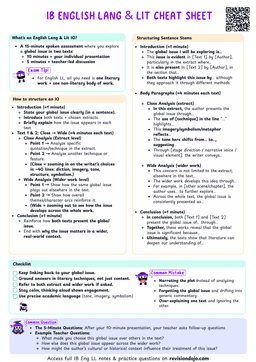A Foolproof Thesis Does One Thing Well
- By now, you should have a clear understanding of:
- The writer’s overall purpose
- The main ideas behind that purpose
- And the language techniques used to express them
- But before you begin your essay, you need to summarize all of this thinking into one powerful sentence. That sentence is called the thesis.
Thesis
One sentence, usually at the end of your introduction, that captures the main argument of your essay.
A Thesis Turns Your Insight into Argument
- A foolproof thesis clearly answers the guiding question in one sharp, specific sentence.
- Really, it should do three things:
- Respond to the question using its key terms
- State what the writer is doing (technique or idea)
- Explain why the writer is doing it (purpose or theme)
- A good thesis answers this question: What is the writer doing and why?
- It should:
- Be no longer than ~30 words
- Use keywords from the guiding question
- Examiners often know whether an essay is going to be strong just from the thesis.
- A vague, unclear thesis makes the whole essay feel aimless.
- A sharp, purposeful thesis shows you understand the text at a deep level.
Keep It Focused
- A common mistake is trying to cram too much into the thesis.
- Students often include irrelevant context, overly long phrases, or vague verbs like “talks about” or “looks at.”
- Poor example: In the short story, the writer talks about the main character being lonely and also how he argues with his parents when he gets home from school.
- This is too long, and the phrasing is casual and imprecise.
- Instead, aim for clarity:
- Use subject-specific verbs: explores, portrays, depicts, critiques, conveys
- Stick to the core message and technique, no extra detail
- Good example: The writer portrays the protagonist’s loneliness through recurring family conflict.
- This is clear, focused, and tied to a specific idea.
Show the 'Why'
- Good theses go beyond what the writer does, they also explain why.
- This means connecting the technique or idea to the writer’s overall purpose.
- You can phrase this in different ways:
- As a message: to expose toxic relationships
- As a theme: to explore the weight of nostalgia
- As a goal: to prompt reflection in the reader
- You don’t need to make up some grand philosophical meaning.
- If the writer’s goal is simply to show how a character feels trapped or misunderstood, just say that.
- Don’t fake depth, examiners see right through that. Aim for accuracy.
Try the sentence starter: The writer [verb] [idea] in order to [purpose]
- The writer criticises political inaction (verb) through visual satire in order to provoke outrage (purpose).
- The author explores the tension (verb) between tradition and change (idea) to reveal the strain placed on family bonds (purpose).
Ask yourself:
- Does my thesis clearly answer the guiding question?
- Is it short, sharp, and easy to spot?
- Does it show both the writer’s technique and purpose?
- Could I write a whole essay proving it?


